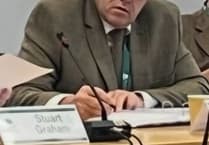Saturday night saw the grand final of Eurovision, hosted in Malmö, Sweden. Plagued by controversy, mere minutes before the show went on air there was speculation artists wouldn’t even perform.
It was announced that a favourite to win, The Netherlands, had been disqualified after an ‘altercation’, prompting many people to further call out the fact that Israel was still allowed to compete. Since October 7th, Israel’s role in the competition has been under intensifying scrutiny, reaching a boiling point when they qualified in the semi-finals. Before that, the Israeli entry had been asked to rewrite her song, originally titled October Rain, as it was thought to be too closely related to the conflict. She was allowed to compete with the song Hurricane. For a competition supposedly not motivated by politics, it was interesting to see the EBU’s defiance of letting Israel compete, particularly when they were quick to stop Russia from competing when they invaded Ukraine.
‘United by Music’ never felt so meaningless, as fans dealt with conflicting feelings on whether or not they should even watch the show. Instead, many in attendance of the live final, and those watching around the country, either left during Israel’s performance or booed loudly. Some even sang Europapa, the Netherland’s entry, in a bid of defiance. 7.64 million tuned in, with a peak of 8.46 million.
Just hours before the show, artists were walking off stage or refusing to perform during their rehearsals. It made for a tense live viewing experience, with threats of terrorism reaching those in Sweden.
But the show went off fine, all things considered. There were no malfunctions, and every artist performed as they were supposed to.
Favourites to win the show included Switzerland, Croatia, the Netherlands, and yes, even Israel. For the UK, Olly Alexander crept back into the top 10 as a bookie favourite when his staging was revealed to show him hurtling through space in a grimy toilet block and dancing with beefed-up men. He promised a gay-themed performance, and he certainly delivered, even if members of the public described it as being ‘too pornographic’. They didn’t say the same for Spain’s entry, which saw men parading around in corsets as she sang about misogyny towards older women.
Olly’s performance saw him score well with the juries, who gave him a total of 46 points. The juries are music professionals in each participating country, and they award points to their favourite artists, taking on board the songwriting, production, vocals and staging. Each jury awards points to their 10 most favoured songs, with a maximum of 12 points going to their top choice. It meant that while the juries liked Olly, the public did not, giving him a total of 0 points - the only country to receive zero points from the public. Olly finished 18th, which is better than last year's entry Mae Muller, but not as good as Sam Ryder, who finished 2nd in 2022.
Olly’s father told BBC News: “To me, it’s a real surprise the public didn’t sort of connect with that song, though the juries gave it a really good score.” Olly is yet to make a public announcement about his placement.
All eyes were on Bambie Thug, who ended up getting the best result for Ireland in almost 25 years. They finished in sixth place. Vocal supporters of Palestine, they were just behind Israel in fifth, and have since come out in anger over the EBU’s treatment of artists backstage, and their decision to let Israel perform. Speaking to the media, Bambie said: “Kan, the broadcaster, incited violence against me twice, three times. We brought it up to the EBU. They said they’d follow up.
“They waited to the last minute, still haven’t gotten a statement back to us, allowed us to be scapegoats, allowed us to be the spokesperson for standing up for ourselves.”
Austria closed the show, with a dance number We Will Rave. But last place is not the best place to compete, and their placement reflected that with a second-to-last finish, ahead of Norway.
Before the public vote, Israel was in 12th place, with 52 points from the jury. Israel received 323 televote points, shifting them to finish in 5th place, though they were the second country to win the public vote.
But the final, tense moment came when it was time to crown the winner. Overwhelmingly winning the juries over was Switzerland’s Nemo, a non-binary singer who sang about gender. It was up to the public to decide on whether or not Nemo was the winner, or if indeed Baby Lasagna should take the spot, with his song about economic migration. With 365 points, Switzerland were ahead. Croatia were third, behind France, with 210. Croatia got 337 points from the public, while Switzerland got 226. Meaning that had it just been the public voting, Croatia would have finished first, and Switzerland fifth. Israel would have finished second.
But it was Switzerland taking the crown, performing their song once more, before calling for peace, saying in their winning speech: "I hope this contest can live up to its promise and continue to stand for peace and dignity for every person in this world."
Another year goes by, though those true Eurovision fans know it will all start again fairly soon with countries announcing participation and artists. Whatever the outcome, no doubt organisers in the EBU are breathing a sigh of relief that a turbulent year is over, though a future looks uncertain.





Comments
This article has no comments yet. Be the first to leave a comment.